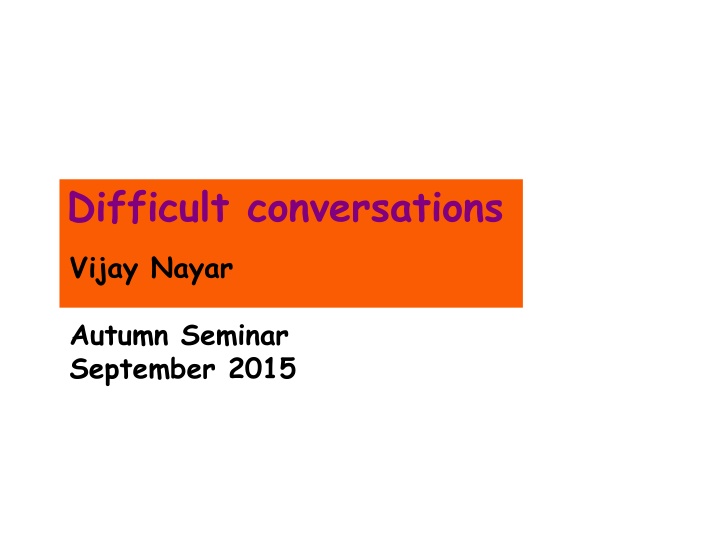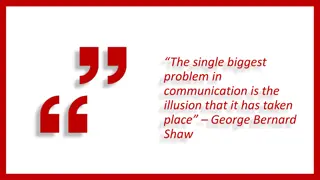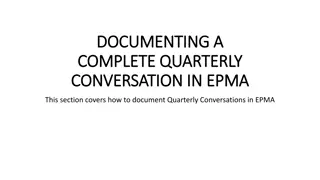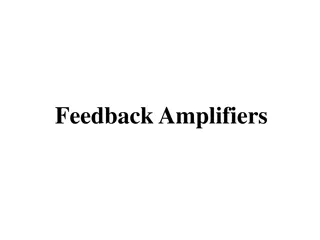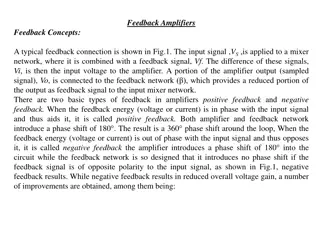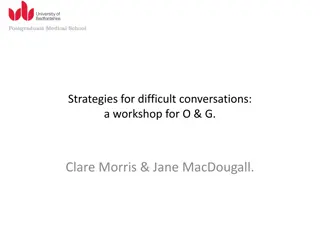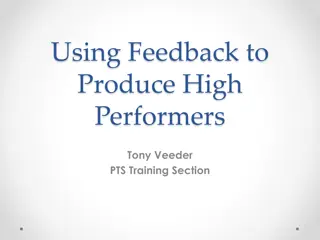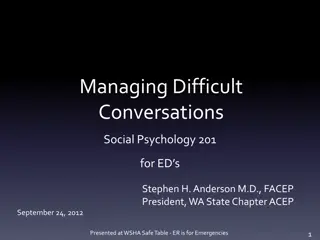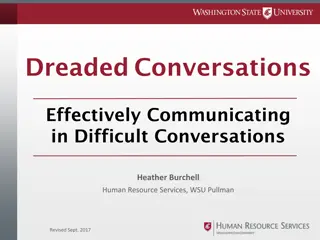Difficult Conversations and Effective Feedback
In this collection of images, insights are shared on managing difficult conversations and providing effective feedback. Topics include the function of feedback, motivation, key principles, defensive reactions, and more. Learn about the importance of timely, accurate, and encouraging feedback that focuses on behavior rather than personality traits. Discover strategies for preserving learners' self-respect through positive feedback and addressing performance areas for improvement. Additionally, explore how emotional support balances challenging interactions and prevents defensive reactions like blaming, denial, rationalization, and anger.
Download Presentation

Please find below an Image/Link to download the presentation.
The content on the website is provided AS IS for your information and personal use only. It may not be sold, licensed, or shared on other websites without obtaining consent from the author.If you encounter any issues during the download, it is possible that the publisher has removed the file from their server.
You are allowed to download the files provided on this website for personal or commercial use, subject to the condition that they are used lawfully. All files are the property of their respective owners.
The content on the website is provided AS IS for your information and personal use only. It may not be sold, licensed, or shared on other websites without obtaining consent from the author.
E N D
Presentation Transcript
Difficult conversations Vijay Nayar Autumn Seminar September 2015
Difficult conversations Function of feedback Effective feedback Difficult conversations
Thoughts about feedback Function of feedback Effective feedback
Function of feedback How am I doing? Motivate Reinforce effective behaviour Encouragement to change Developing self esteem Increase insight, capability self awareness and effectiveness Sharing expectations
and Effort Motivation Certain Goal Impossible
Trainee Known by Unknown by Open Blind Known by Feedback Self disclosure Trainer Learning needs assessments Unknown by Hidden Unknown
Effective feedback Descriptive of the behaviour not the personality Give specific examples Given as close to the event as possible Meaningful Accurate Timely Encouraging Sensitive to the needs of the receiver Directed towards behaviour that can be changed Reflective
Positive Feedback Preserves or enhances the learner s self respect Negative feedback Reduces the learner s self respect X Feedback about Good performance X Feedback about performance that needs to be or could be improved
Key principles When the challenge increases, so must the support Emotional bank balance - withdrawals cannot be sustained without credits in place first It does not allow either party to downplay strengths or to duck difficult issues
Defensive reactions to feedback Blaming and excuses - "It's not my fault because... Denial - "I can't see any problem with that" Rationalisation - "I've had a particularly bad week" "Doesn't everyone do this?" Anger - "I've had enough of this"
We can also be defensive Obligation - "I'm duty-bound to tell you this" Moral high ground - "It's for your own good" Burying and fudging - Taking a long time to get to the point and covering many irrelevancies. Minimising - "Don't worry, it's not such a big deal. Everyone does it at some time Colluding - "You're probably right, perhaps I am overreacting"
Dealing with defensiveness Name and explore resistance You seem bothered by this. Help me understand why Keep the focus positive Let s recap your strengths and see if we can build on any of these to help address this problem Try to convince the trainee to own one part of the problem So you would accept that on that occasion you did lose your temper
Dealing with defensiveness Acknowledge emotions Do you need some time to think about this? Keep responsibility where it belongs What will you do to address this? If recipient is in denial: reiterate the facts, describe the behaviour
Strategy for difficult conversations Time and place, don t ambush Provide emotional support Be clear about concern Be clear about your objective Let them tell their story Manage emotions A pause has a calming effect Preserve the relationship Be fair and consistent Address defensiveness openly and sincerely High support and high challenge
Difficult conversations active listening open, reflective, facilitating, and closed questions be challenging provide insight into strengths and limitations help trainees to resolve difficulties by o listening and asking o not telling and providing solutions
